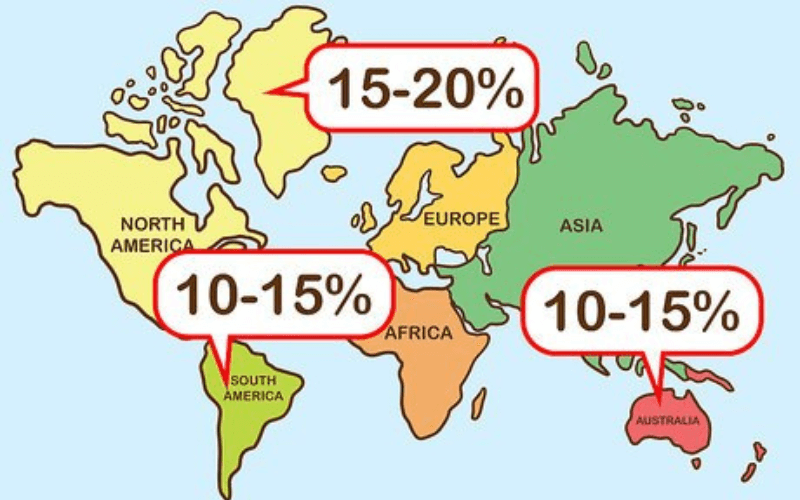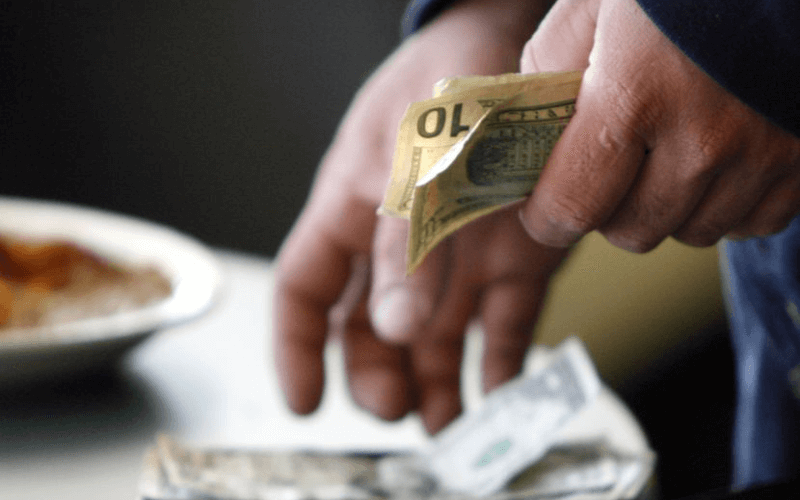Finding out about the
tipping culture of a country while on holiday can be stressful and bewildering.
In the United States,
tipping is instinctive, but that is not universally true across the globe. For
example, in Japan, leaving a tip for the waiter is considered offensive.
The guidelines are less
clear-cut in many other nations. In reality, tipping customs tend to be
ambiguous or so diverse that a standard is often non-existent.
In numerous European and
Asian countries, servers will not be offended if no gratuity is left after a
meal. In other places, it is most common to instruct your server to "keep
the change" or leave a tip by phone.
This means that as a
tourist, you will often have to rely on your own judgement when deciding on a
gratuity. Some factors to consider are: the minimum wage in the country you are
visiting, the ambiance of the restaurant, and the quality of the service.

Nevertheless, regardless of
the tipping culture in the country you are visiting, it is almost always a
thoughtful gesture of appreciation to leave a gratuity of at least 10 percent,
either in cash or via a tipping app.
If you find yourself truly
uncertain, refer to this useful manual for (almost) every country where it is
customary to leave a tip.
Where does the practice of tipping originate
from?
No one truly knows, but the
speculation is that it began in 18th century England. To accommodate rushed
patrons, a proprietor of a restaurant introduced a container to ensure
promptness. Those in a hurry would place coins in the container to receive
expedited service. This is how the practice of gratuity came about.
The tradition has spread to
other countries and eras, for better or worse. Even though we often perceive it
as a small expression of gratitude, the gratuity is occasionally an essential
component of an employee's income.
In the 1960s, the American
Congress had the peculiar notion of enacting a law that permitted companies to
pay certain employees below the minimum wage. The remainder of their earnings
would be supplemented by tips.
This elucidates the current
predicament of many American workers, who are compelled to contend with meager
salaries, which are augmented by gratuities.
This should facilitate
comprehension of how significant the additional sum of money you leave with
your bill is.
🔘 Related: Tipping Your Valet: Rules to Follow For 2023 and Beyond
Countries where you should always tip
Traveling abroad presents a
chance to explore diverse attractions, activities, and culinary delights.
However, navigating through unfamiliar customs can be perplexing, particularly
when it pertains to the matter of tipping.
From the moment you step off
the aircraft, you must navigate the contrasting tipping customs for luggage
handlers, cab drivers, and hotel staff.
Therefore, it is advisable
to have an ample supply of euros, rubles, or pesos at hand to prevent any
uncomfortable situations.
🌎 United
States
When you think about
tipping, the first name that comes to mind is united states. Tipping, which is
also referred to as a gratuity in this country, is the act of requesting a
monetary expression of gratitude from servers or customer service
representatives.
The customary tip amounts
vary from 15 to 20 percent. You might encounter it included in your restaurant
bill, a tip container at a bakery, or you may feel compelled to leave one when
a stranger serves your food or beverages.
Nowadays, there are even
tipping apps that allow people to leave a tip by phone.
Many individuals in the
service industry earn lower wages and heavily rely on tips as a significant
portion of their income.
When visiting united states,
trust your intuition in this matter, as Americans have a remarkable memory when
it comes to individuals who neglect tipping.
🌎 Canada
Canadians are well-known
worldwide for their courteous manners and pleasant smiles, and you will often
witness this reflected in their customer service.
Their attitude towards
gratuities is very similar to that of the United States, with a customary tip
range of 15 to 20 percent being deemed acceptable.
The tip may be included in
your bill at certain establishments, or you may choose to adhere to the
country's custom of offering money as a gesture of appreciation for the service,
which is typically compensated at the minimum wage rate.
Canadians also generally
dislike and find it inappropriate when asked if they require change from a
bill. They prefer to determine the amount and manner of their tip themselves.
It is wise to follow their
lead. If you do decide to tip, either cash or cashless tipping, avoid being too
stingy.
If you are unable to afford
it, it is acceptable not to tip. Offering mere pennies or a dollar or two on a
$100 bill will be considered offensive and will not be met with a smile by
Canadians.
🌎 Belgium
Tipping customs in Belgium are
slightly different from Canada, because there is a "retain the
alteration" policy in this country.
That is their norm of
gratuity, and you might observe a bill rounded up to the subsequent dollar
value.
You can leave that as your
gratuity, or add more if you have encountered your service experience
especially enlightening.
🌎 The Caribbean
The Caribbean is a popular
destination for North Americans to visit as it is frequently brief in travel
duration and a simple escape to a place with a perfect climate.
The Caribbean is also the
residence of several nations that incline and anticipate gratuity in exchange.
The local attitude is highly focused on service due to the multitude of
tourists this area attracts each year.
Frequently, a 10 to 15
percent surcharge is included in your bill at a restaurant and hotel.

Anything extra is at your
discretion, but a generous tip will be remembered and rewarded with exceptional
service throughout your entire stay while you are exploring in this area.
🌎 The
Middle East
In the UAE, Saudi Arabia, Qatar,
and Jordan, waiters in dining establishments will anticipate a 10 to 15%
gratuity at the conclusion of a meal.
Even in Dubai, where the
authorities require 10% being included in invoices at dining establishments,
hotels and bars, staff will still anticipate a gratuity of up to 15%, or even
20%.
Eateries in Israel will
frequently include a 10% service fee to invoices in dining establishments and
bars, so always verify before you begin counting out your banknotes to prevent
unnecessary dual tipping.
🌎 Brazil
In Brazil, a gratuity is a
customary practice as it is in America and Canada. When you go out, make sure
you have enough for the meal and the gratuity.
Brazil tipping norms are
around the 10 percent mark. What makes this country a little simpler to budget
for is that their menu prices will already reflect the cost of sales tax. That
may make it simpler for you to budget your gratuity.
In other countries that you
should tip, customers will tip 15 to 20 percent on the pre-sales total. In
Brazil, it is up to you if you want to go above the 10 percent rate.
🌎 Chile
In Chile, it is customary to
give your server a 10 percent gratuity. Nevertheless, if you are dining in a
metropolitan area or at an establishment that caters primarily to foreign visitors,
it is possible that a higher gratuity of approximately 15 to 20 percent may be
anticipated.
If the restaurant has included
a 10 percent service fee on your invoice, you are always welcome to provide an
extra tip, whether in cash or via a tipping app.
🌎 Egypt
In Egypt, gratuity is
referred to as backsheesh, and it’s anticipated from both residents and foreign
visitors.

Tips are a gesture of
gratitude for excellent service and a delightful dining experience. Frequently,
a service fee of approximately 12 percent will be included in the restaurant
invoice but not consistently.
Adding an extra 10 percent
as a tip on top of the service fee is regarded as courteous.
🌎 Morocco
Gratifying all those who
offer a service is customary practice in Morocco. In more upscale dining
establishments, the typical gratuity amounts to approximately 10 percent.
In coffee shops and other
less formal dining places, it is expected to round up to the nearest whole
amount from the bill's total and present that as a gratuity.
Frequently, you will settle
the bill directly with the server at your table, allowing you to leave a tip by
phone or leave cash on the table.
🌎 Africa
Kenya, Senegal, Tanzania, South
Africa, Mauritius, Tunisia, Madagascar, and Morocco are nations where tipping
customs are part of the tourism industry.
It is suggested to give
gratuities in restaurants, bars, lodgings, for security services, tour guides, hotel
attendants, etc. The gratuity may already be included in the invoice, as is the
situation in Mauritius.
However, you can always
leave an additional 5-10% as a gesture of your contentment in the form of cash
or via a tipping app.
In Tanzania, you are
expected to tip the Maasai to have your picture taken with them. In the end,
they are serving as subjects for your digital photo collections and Instagram
profiles.
In Egypt, tipping is highly
recommended. Be prepared to give a 10% gratuity to taxi drivers, hotel
attendants, baggage handlers, and other individuals working in the tourism
industry.
🌏 The
United Kingdom
At seated eateries, it’s
traditional to give a gratuity of 10 to 15 percent based on the level of
service.
Make sure to review your
invoice before leaving a tip as some restaurants may already include a gratuity
of approximately 12 percent if you’re dining with a large party (you don’t need
to add an extra tip on top of that).
If you don’t notice a
gratuity charge on your bill, a minimum tip of 10 percent is acceptable.
Pubs can be a bit more
complicated, but to err on the side of caution, if the establishment offers an
extensive food menu, it’s likely best to tip as if you were dining at a
restaurant.
🔘 Related: Best Restaurants in the UK
Conclusion
You've recently relocated
overseas, and you've just completed a fantastic dinner on a restaurant patio.
The climate is delightful, and the ambiance is as well.
You want to vacate your
table to take a leisurely walk and aid in digestion while savoring the scenery.
It's time to settle the bill for your outstanding meal, and here comes the most
intricate aspect.
It's not that you lack
funds. You've brought ample amounts of the native currency, and your credit
card is also well-supplied. However, you're uncertain whether or not you should
leave a gratuity.
Tipping customs change in
time because tourism shapes cultural values and wage laws change.
If you are traveling and don't
know whether to tip or not, ask locals or your server if tipping is customary.
If it seems inappropriate to ask, simply round up the bill.
If you want to try cashless
tipping, you can leave a tip by phone via Tipsy. This great tipping app allows
you to show your gratitude and make someone’s day!